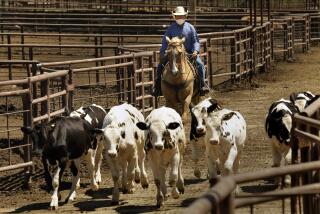Consequences of Eating Red Meat
- Share via
The columns by Alexander Cockburn (“Inevitable Consequences of Eating Meat,” March 28) and Ken Vorisek (“Lessons on Survival From a Jackal’s Dinner,” March 29) certainly stimulated my thinking enough for a response. Cockburn obviously doesn’t like to eat red meat (especially from cows). After the news from England regarding the “mad cow disease,” he will, no doubt, be joined by many others in that preference.
I don’t agree with Cockburn, however. I like red meat. If I were a hunter in days of yore, I would probably eat red meat from some wild animal as Vorisek suggests, because, for better or worse, I am a carnivore (as well as a herbivore) and I need food to survive. When man settled down, there were hardly enough wild animals to supply his needs so he became a husbandman. Cows, sheep and pigs turned out to be a far better crop than deer, elk or moose; so good, in fact, that mankind’s number grew beyond the scope of the land to support the animals required. It is human need due to overpopulation, not animal greed, that denudes forest and prairie.
Nature’s way of controlling overpopulation is starvation, pestilence or violence. We know better ways. It is those ways that we must use to save the beauty of this world for generations to come, not simply refraining from eating red meat.
JAMES GOBBLE
Simi Valley
* Vorisek argues that since wild animals kill each other to survive, there are no moral issues involved in big-game hunting or meat-eating by humans.
However, mass production of commercially manipulated meat products is anti-nature. As Cockburn pointed out, it leads to the rape of the environment. Nor is a high-protein diet natural or historical for human beings, which is why this has had such a terrible impact on our health.
This column was just a pitiful attempt to justify Vorisek’s bow-hunting by trying to erase the distinction between eating to survive and eating for indulgence. The moral and intelligent way is to try to minimize the impact of our diet on the planet, ourselves and other living things. There is a difference between eating dogs and eating wheat (let it be noted that vegetarians consume far fewer plants, because the production of meat requires enormous quantities of vegetation to convert into flesh).
SCOTT SMITH
West Hollywood
* In your article on the “mad cow” disease (March 31), your reporter interviewed several farmers who raise beef cattle. One says, “I only have animals because I like ‘em.” Another bemoans “the heartbreak of losing the animals” to the disease. I am astounded at their hypocritical concern for animals they are raising to be slaughtered and eaten. Surely this horrible disease and all its consequences will create hundreds of committed vegetarians who are concerned about the welfare of animals and the health of human beings.
KATHRYN S. TARBELL
Fountain Valley
More to Read
Eat your way across L.A.
Get our weekly Tasting Notes newsletter for reviews, news and more.
You may occasionally receive promotional content from the Los Angeles Times.








